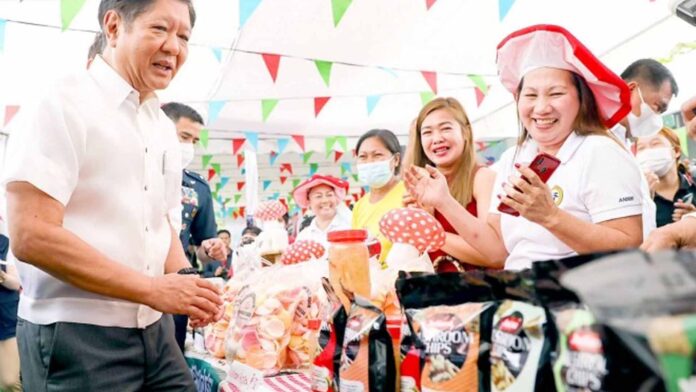President Ferdinand R. Marcos Jr. on Wednesday led the launch of a special Kadiwa ng Pangulo (KNP) outlet dubbed “KNP Para sa Manggagawa” (KNP for Workers) in Quezon City, citing workers’ crucial role in the country’s economic and social progress.
The KNP Para sa Manggagawa outlet is located at the Trade Union Congress of the Philippines (TUCP) head office in Quezon City.
In his speech, Marcos bared that it was Department of Labor and Employment (DOLE) Secretary Bienvenido Laguesma who raised the idea of putting up Kadiwa outlets specifically for workers during one of their meetings.
“Ang sabi ko naman ay karapat-dapat lang naman na gawin yun dahil umaasa tayo sa ating mga manggagawa sa pagahon ng ekonomiya ng Pilipinas (I told him that they deserve it because we depend on our workers for the recovery of the Philippine economy),” he said.
He underscored the need for government to prioritize the labor workforce, citing how they would always be the sector left behind by industrialization.
“Sa pag-aaral ko, ‘pag nag-industrialize ang isang bansa, kung minsan naiiwanan ang labor. Kaya’t sinasabi ko lagi huwag natin pabayaan mangyari ‘yun dahil napakalaki ng ating labor force, napakadami ng mahihirapan kung talagang hindi natin alagaan nang mabuti at bantayan nang mabuti ang kanilang kalagayan habang yumayaman ang Pilipinas ay maganda ang takbo na ngayon ng ekonomiya (When a country industrializes, sometimes workers are left behind. That’s why I always say we must not let that happen because our labor force is so big, so many people will suffer if we don’t take good care of them and watch their condition carefully while the Philippines is getting rich, the economy is doing well now,” he added.
Marcos said it was not enough that only the upper and middle-class Filipinos benefit from the growth in the country’s economy, it should be felt by laborers, farmers and fisherfolk.
“Sabi ko eh maganda ang idea ni Secreary Laguesma na manggawa tayo para talaga, tinutukoy ang ating mga manggagawa (That’s why I said Secretary Laguesma’s idea of putting up a Kadiwa for workers is good),” he said.
“Hindi namin titigilan po ito hanggang masabi natin na ang bilihin ay bumababa na ang presyo. Baka sabihin natin kahit bumaba ang presyo ng mga bilihin ipagpatuloy pa rin natin ang kadiwa dahil kahit papano may savings pa rin ‘yan kung gobyerno ang gumagawa (We will not stop doing this until the prices of goods have been lowered. Maybe we can say that we might even continue Kadiwa even if the prices of goods have gone down because there will still be savings if the government made this intervention),” he said.
He likewise reiterated his promise to put up more Kadiwa centers nationwide and turn them into a “permanent” government program.
“Ngayon nagiisip na kami to evolve it. Hindi ito mga pop-up kung tawagin kung hindi meron na tayong permanent na Kadiwa centers sa ibat ibang LGUs. Pinagiisipan na namin kung saan pwede ilagay ‘yan (Now, we are thinking of improving it. They won’t be just pop-up stores, they will be permanent Kadiwa centers in different LGUs. We’re trying to think of areas to set them up),” he said in a media interview.
The KNP Para sa Manggagawa is an expansion of the highly successful Kadiwa program launched in November last year and led by the Office of the President (OP) together with the Department of Labor and Employment (DOLE), Department of Agriculture (DA) headed by the President, Department of Trade and Industry (DTI), Department of Social Welfare and Development (DSWD), National Food Authority (NFA) and local government units (LGUs).
Around 33 sellers from the DA, DTI, DOLE and sellers brought in by the Quezon City government are participating in the KNP para sa Manggagawa outlet.
DOLE provided wages for participating sellers under the Tulong Panghanapbuhay sa Ating Disadvantaged/Displaced Workers (TUPAD) program.
The Kadiwa project provides a direct farm-to-consumer food supply chain to eliminate several marketing layers and help boost the income of local agricultural producers.
To date, there are nearly 500 Kadiwa stalls nationwide.
Kadiwa stalls were a brainchild of Marcos’ parents, the late President Ferdinand E. Marcos Sr. and former First Lady Imelda Romualdez Marcos. (PNA)






